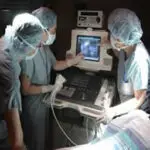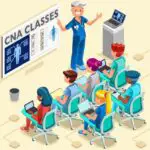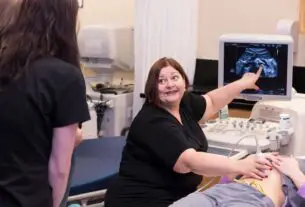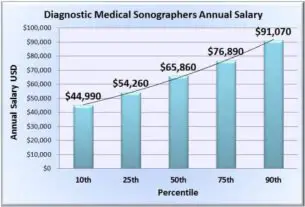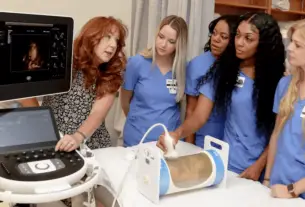Ultrasound technician courses typically include both online and in-person components. Online classes may include lectures, readings, and assignments that students can complete at their own pace. These classes may cover a variety of topics, including anatomy, physiology, and medical terminology, as well as the principles of ultrasound technology and its clinical applications.
In-person components of ultrasound technician courses may include lab work and clinical training, where students can gain hands-on experience using ultrasound equipment and performing diagnostic exams on patients. These practical components are typically completed at a healthcare facility or clinical training site.
It is important to note that ultrasound technician programs vary in terms of their specific course offerings and requirements, and some programs may have more online or in-person components than others. It is important to research and compare different programs to find the one that best meets your needs and career goals.
What courses are required for ultrasound technician?
The specific courses required for ultrasound technician programs may vary depending on the program and the level of education you are seeking. However, common courses that may be included in ultrasound technician programs include:
- Anatomy and physiology: These courses cover the structure and function of the human body, including the musculoskeletal, cardiovascular, and reproductive systems.
- Medical terminology: This course teaches students the technical language used in healthcare settings, including terms related to medical procedures, diagnoses, and treatments.
- Ultrasound physics: This course covers the principles of ultrasound technology, including the physics of sound waves, image production, and image quality.
- Clinical applications of ultrasound: This course covers the use of ultrasound in a clinical setting, including the performance and interpretation of diagnostic exams, as well as the protocols and guidelines for patient care.
- Clinical training: This course provides hands-on experience using ultrasound equipment and performing diagnostic exams on patients. This may be completed at a healthcare facility or clinical training site.
In addition to these courses, ultrasound technician programs may also include courses in patient care, medical ethics, and professional development. It is important to research and compare different programs to find the one that best meets your needs and career goals.
Top 10 ultrasound technician courses requirements
Here are the top 10 course requirements for ultrasound technician programs:
- Anatomy and physiology: This course covers the structure and function of the human body, including the musculoskeletal, cardiovascular, and reproductive systems.
- Medical terminology: This course teaches students the technical language used in healthcare settings, including terms related to medical procedures, diagnoses, and treatments.
- Ultrasound physics: This course covers the principles of ultrasound technology, including the physics of sound waves, image production, and image quality.
- Clinical applications of ultrasound: This course covers the use of ultrasound in a clinical setting, including the performance and interpretation of diagnostic exams, as well as the protocols and guidelines for patient care.
- Clinical training: This course provides hands-on experience using ultrasound equipment and performing diagnostic exams on patients. This may be completed at a healthcare facility or clinical training site.
- Patient care: This course covers the principles of patient care, including communication with patients and their families, infection control, and patient safety.
- Medical ethics: This course covers ethical issues that may arise in a healthcare setting, including confidentiality, informed consent, and patient autonomy.
- Professional development: This course covers topics such as resume writing, job search strategies, and professional networking.
- Communication skills: This course covers effective communication with patients, colleagues, and other healthcare professionals.
- Computer skills: This course covers the use of computers and software in a healthcare setting, including electronic medical records and diagnostic imaging systems.
It is important to note that ultrasound technician programs may have different course requirements and may offer additional courses not listed here. It is important to research and compare different programs to find the one that best meets your needs and career goals.
How to find Best ultrasound technician courses near me?
There are a few steps you can take to find the best ultrasound technician courses near you:
- Determine your career goals: Before you start looking for ultrasound technician courses, it is important to think about your career goals and what you hope to achieve through your education and training. Consider the type of program you are interested in (e.g., certificate, associate degree, bachelor’s degree), the specific areas of ultrasound you want to specialize in (e.g., abdominal, vascular, obstetrical), and any other relevant factors, such as your schedule and location.
- Research accredited programs: It is important to find a program that is accredited by a recognized accrediting body, such as the Commission on Accreditation of Allied Health Education Programs (CAAHEP). Accredited programs meet high standards of quality and are more likely to prepare you for a successful career as an ultrasound technician.
- Consider the program’s reputation: Look for programs that have a good reputation in the field and have a track record of producing well-trained and successful graduates. You can research program reviews and ratings online or ask for recommendations from other healthcare professionals or educators.
- Contact the program: Once you have identified a few programs that meet your needs and goals, reach out to them to learn more about their course offerings, requirements, and application process. You may also want to visit the campus or attend an information session to get a better sense of the program and its facilities.
- Compare programs: After you have gathered information from multiple programs, compare them to determine which one is the best fit for you. Consider factors such as the cost of tuition, the duration of the program, the availability of financial aid, and the location and convenience of the campus.
Top 10 Components of ultrasound technician courses online
Here are the top 10 components of ultrasound technician courses that may be included in an online program:
- Lectures: Online courses may include recorded or live lectures that cover the material students need to learn. These may be accompanied by slides, images, and other visual aids.
- Readings: Students may be required to complete readings from textbook or other resources as part of their coursework.
- Assignments: Online Ultrasound Technician Courses may include assignments such as quizzes, exams, and essays to assess student understanding of the material.
- Labs: Some online programs may include simulations or virtual labs that allow students to practice using ultrasound equipment and interpreting images.
- Clinical training: Online programs may include clinical training components, such as video demonstrations or interactive simulations, to prepare students for hands-on clinical experience.
- Group discussions: Online courses may include forums or discussion boards where students can collaborate with their peers and engage with the material.
- Interactive media: Some online courses may include interactive media, such as videos or games, to engage students and make learning more interactive.
- Professional development: Online courses may include professional development components, such as resume writing or job search strategies, to prepare students for their careers.
- Student support: Many online programs offer support services, such as academic advising, tutoring, and technical assistance, to help students succeed.
- Flexibility: One of the main advantages of online courses is their flexibility, allowing students to complete their coursework on their own schedule.
It is important to note that online ultrasound technician courses may vary in terms of their specific course offerings and requirements, and some programs may have more or less of these components than others. It is important to research and compare different programs to find the one that best meets your needs and career goals.
Technology is developing at a rapid speed and the need to move along with it is increasing at an alarming rate. With this development medical science has had a remarkable development in the field of ultrasound technology too. With developed information mechanism and technology, ultrasound technology has not only become easier but also famous and in demand. Many students wanting to take this course were unable to do so because of financial and time barriers but now you do not need to go to classes to take the course. There are numerous colleges offering programs that allow you to take the course from your home or workplace or any place you are comfortable with.

These courses offered by many colleges are similar to the course you take in a class. They are not different so you do not need to worry about learning less or loosing credit. The course design is the same and components of online programs are as same as in live courses. The coursework provided by the programs in school are same as the coursework provided by online course. For instance, the introductory courses in sonographic instrumentation and procedures are included in the coursework of an associate degree and the same course is also included in any online associate degree coursework.
Online courses are not limited to hearing online lectures and submitting online assignments, you will take practical classes along with students in live classes. The lecturers will contact you and call you for the practical classes. Also, you will need to learn medical terminologies, and courses like sectional anatomy, pathophysiology, sonographic physics and imaging and medical ethics even when you are taking an online course.
Among many other components one of the main course components is sonographic instrumentation. You will be taught to use instruments and know the procedures to use sonographic machines. This does not limit to learning to use but you also need to learn the function mechanism and maintenance of these equipments.
As mentioned above Sectional anatomy is one of the components and under this you will learn about different parts of body and the methods of diagnosis. The major parts or the parts that are imaged the most are practiced often so that you are familiar with the procedure. Other than these, you must be very active, communicative and must follow the ethics that should be followed by any ultrasound technician. Learning to become professional is also one of the major components of online ultrasound technology.
Pros and Cons of Becoming an Ultrasound Technician




